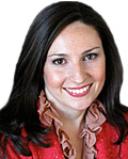Self-Help
Generation Earn: New Year's Money Tips for Young Adults
Smart Spending & Saving Advice for Young-Professionals
Posted December 30, 2010
Young people have been dubbed Generation Debt-a group of slackers who spend on credit and lack their grandparents' frugality. But as we look to new beginnings this New Year's, it's time to throw off this unfair label that can turn into a dangerous self-fulfilling prophecy for the future: Twenty-somethings aren't group of loafers profligate with their money; rather, this is a generation coming of age in tough economic times, desperate for some user-friendly information on modern, values-based ideas of spending, saving and giving back.

U.S. News & World Report financial columnist Kimberly Palmer realized that young-adults saddled with the Generation Debt moniker and had very few financial experts directing advice specifically toward the needs of their generation. In response, she wrote Generation Earn: The Young Professional's Guide to Spending, Investing and Giving Back. It's a personal finance book focused on the life transitions of young-adulthood-graduating from college with a pile of educational debt, the decision move back in with your parents or struggle through with six roommates and the how to start changing the world before you've earned your first million.
Generation Earn is an upbeat book that offers financial education without a lot of parental finger-wagging. From tidbits on why it's good to ask for more money at the start of your career to practical information on when to pay of different kinds of debt and how to join a giving circle with friends and family, Generation Earn offers a researched, no-nonsense approach to money realities. And running throughout the book is the message that spending and saving reflect your core values and choices, not just a string of numbers on a ledger sheet.
If getting a handle on your finances is on your list of New Year's Resolutions, Palmer has some specific advice geared to get you started:
Decide on your goals. Do you want to have more money in your bank account? Take a five-star vacation? If you're having trouble putting your finger on it, ask the people who know you best. Brainstorming with your significant other, family members, and friends can help shake loose your own thoughts. Then, write them down.
Do a little every day. Take small steps towards your big goals every day, even if it means spending 60 seconds checking out a relevant website before bed. If you want to launch a small business, for example, small steps can include purchasing your website name, interviewing web designers, and reading a book or two on being an entrepreneur.
Give yourself a stress test

Give yourself a stress test
Start earning extra money on the side. Many people don't realize that they have valuable skills that other people are willing to pay for, such as a second language, editing, event planning or craft skills. The extra cash can give you additional job security, and might even lead to a successful small business in the future.
Schedule creative time for yourself. You can boost your productivity with scheduled downtime, where you give yourself the freedom to brainstorm about new ideas and possibilities for yourself and your career. Block out time on your calendar in advance.
Have more financial advice to share with young-adults as we all turn over a new leaf in 2011? Post your comments below.


